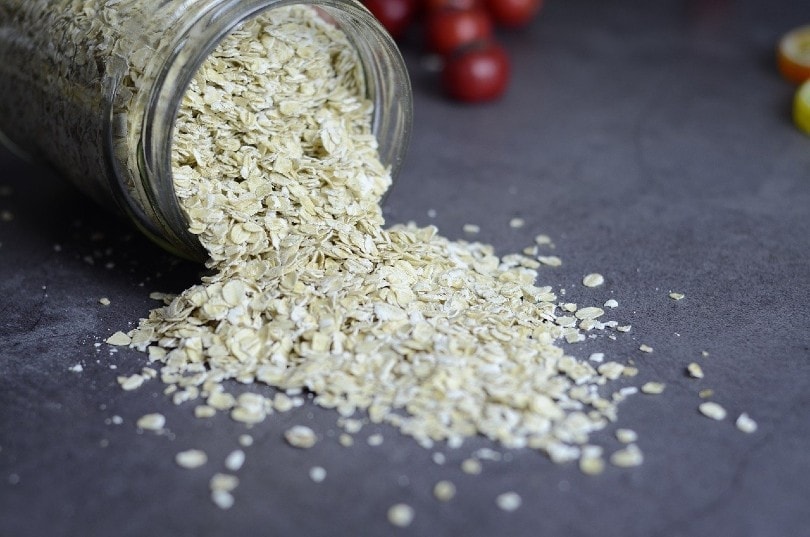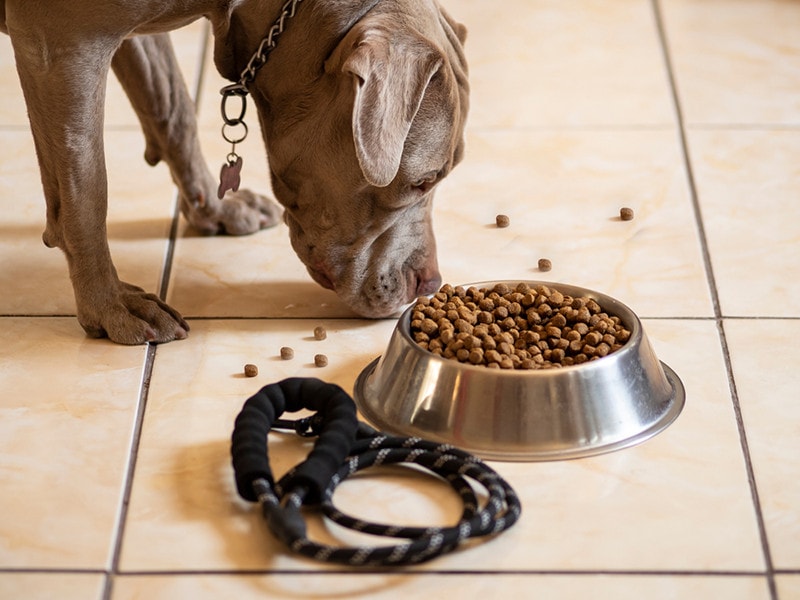Can Dogs Eat Oatmeal? Is It Safe For Dogs?

Updated on

Oatmeal is a staple part of the human diet, commonly eaten for breakfast and used to bulk up foods. It is highly nutritious, rich in antioxidants, and is a filling food source that will save your dog’s appetite.
Oatmeal is a beneficial addition to the human diet, but is it good for dogs? Can, and should, you add it to your dog’s diet and feed it to them regularly?
The short answer is yes. Not only is it safe for dogs but it’s considered beneficial. However, as with most foods, there are some caveats to consider.
The Benefits of Oatmeal for Dogs
High in fiber and with a huge assortment of antioxidants and necessary vitamins and minerals, dog food manufacturers use oatmeal to bulk up food as a healthy additive.
Replacing Food Allergens with Oatmeal
Wheat and grain insensitivity are relatively common in dogs. This can be a problem because a lot of commercial foods use wheat and other grains as a source of nutrition in their ingredients. Allergies and insensitivities have symptoms including stomach upsets as well as flaky and itchy skin. It is relatively easy to determine a food allergy, but it can be difficult to avoid problem foods.

Oats Are Good for an Elimination Diet
An elimination diet allows you to identify allergens in your dog’s food. Prepare food that includes novel proteins that your dog has not previously been fed. This might include meat protein from sources like rabbit. Source additional proteins from ingredients like potato. Many people use oats as a protein source.
After feeding these novel proteins to your dog, you can start to introduce new ingredients. Add a single ingredient at a time and check for signs of allergy. If they show an allergic reaction, remove that ingredient. If they show no signs of allergy, you can add another ingredient, and keep adding new ingredients until you identify all sources of allergens.
Oats are a good option for an elimination diet. What’s more, if you discover that your dog is allergic or sensitive to wheat and other grains, you can feed them oats as a substitute. It effectively bulks up food, provides a good source of fiber, and provides a massive range of vitamins and nutrients that they require.
A Good Source of Vitamin B12
Vitamin B12, or cobalamin, ensures a healthy nervous system, regulates brain function and is vital in the formation of blood cells. It also helps dogs maintain a healthy digestive system. Symptoms of B12 deficiency include listlessness and a loss of appetite. It can also cause diarrhea and can even lead to a loss of brain function with symptoms that include confusion and even seizures. Some breeds, such as Australian Shepherds, Border Collies, and Beagles, are naturally predisposed to vitamin B12 deficiency because they struggle to absorb B12. Finding a reliable source of this vitamin is especially important for these breeds, but it is important for all dogs.
Vitamin B12 is commonly found in meat products including beef and chicken. It is not normally found in vegetables or fruit. As a cereal, oatmeal is a good non-meat source of vitamin B12. It can be used to supplement levels of the vitamin that your dog gets from meat sources.

Omega-6 In Oatmeal
Oats are considered a healthy source of omega-6 oils. Pets require both omega-3 and omega-6 oils, although you will find a lot of sources wrongly claiming that omega-6 is a bad fatty acid. Dogs require both to help ensure optimal coat and skin health. Omega-6 is a pro-inflammatory, so if your dog suffers from skin inflammation, you should limit the intake of this nutrient. Otherwise, it is a vital ingredient that can reduce other skin complaints and improve the overall health of their coat.
Soluble Fiber
Oatmeal is also considered a good source of soluble fiber. Fiber is obviously important for ensuring healthy and regular bowel movements when fed in the proper quantities. It can also normalize blood sugar levels, but you do need to ensure that you do not feed too much fiber to your dog. Too much fiber can lead to diarrhea and vomiting and may cause damage to your dog’s gastrointestinal health.
Oatmeal Precautions
So, oats are not only safe for your dog, they can be beneficial when fed as part of a balanced diet. They should not be fed as a meal replacement but can be added to other foods. There are some precautions that must be taken when feeding this whole cereal to your pet to ensure their safety and good health.
Don’t Serve Raw Oats
Raw oats are a popular additive to a lot of human meals. They bulk up food, have a unique texture, and they can add a unique taste to food. However, your dog won’t be able to digest raw oats well. You should always ensure that the oatmeal is prepared before feeding because this softens the oats and makes it easier for your pup to digest them.
Prepare Using Water
Oatmeal is high in fiber. Feeding too much to your pup can cause stomach upsets, and this is especially true if you prepare it with milk. Dogs are sensitive to dairy, and a large number are lactose intolerant. Even if milk doesn’t have a negative health impact immediately, it can lead to a gaseous dog and may cause health problems further down the line. Their bodies are unable to break down lactose easily so you will need to prepare their oatmeal using water. Use very warm water, but not boiling. Feeding boiling water can damage the inside of your dog’s mouth.
Exclude Additives
Do not include additives like sugar, salt, or butter. These extra ingredients make oats more palatable for humans but are potentially very harmful to your dog. Chocolate, raisins, and grapes are other ingredients that we commonly add to our own oatmeal, but these are actually toxic to dogs and should not be fed in any quantity.
Avoid Processed and Flavored Oatmeal
Similarly, flavored and instant oatmeal should be avoided. Instant oatmeal might be quicker and easier to prepare but it has been processed and dogs cannot stomach processed foods. The processing of oatmeal also means that it loses a lot of its nutritional value, and your dog will not benefit. Flavored oatmeal includes extra ingredients like sugar or sweetener. Both ingredients are bad for your dog. Xylitol is a commonly used sweetener and is toxic to dogs, so even a small amount can cause them harm.

Feed Oatmeal to Your Dog Sparingly
Too much of any human food can prove dangerous or unhealthy for dogs, and this is even true of oatmeal. It is generally accepted that you can feed approximately one tablespoon of this ingredient for every 20 pounds of dog weight.
Avoid feeding too much oatmeal at one time. It contains a lot of carbohydrates and your dog will consume too many calories if you feed them too much. It can also lead to bloat, which is potentially life-threatening for dogs. Only feed your pup this treat once or twice a week.
Oatmeal Is Not A Meal Replacement
Oatmeal should be given as a treat or as an additive to an existing diet. Your dog needs a healthy and balanced diet to ensure that they get all the vitamins and nutrients that keep them fit and healthy. While oatmeal does have a number of beneficial vitamins and minerals, it should only be fed infrequently, as it does not contain everything your dog needs to stay healthy. Feed it as a breakfast treat once or twice a week, give it as a treat if your dog is particularly keen, and your pooch will experience the benefits without the undesirable side effects.
Final Thoughts
With so many caveats, it can sound like feeding oatmeal is more trouble than it’s worth. However, this isn’t the case. Buy good quality, organic oatmeal that is free from additives and prepare it with very warm water. Feed it in moderation, as part of a balanced diet, and it is not only considered safe to feed your dog but could help with allergies and can be used as an effective and appealing replacement for wheat or other food sources that your dog is allergic to.
Featured image credit: Miroslavik, Pixabay












